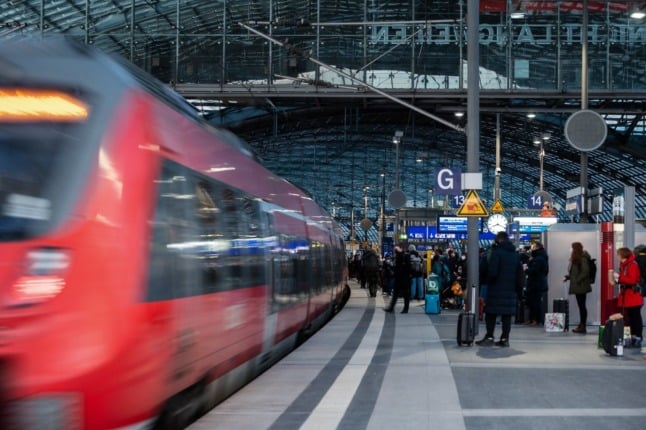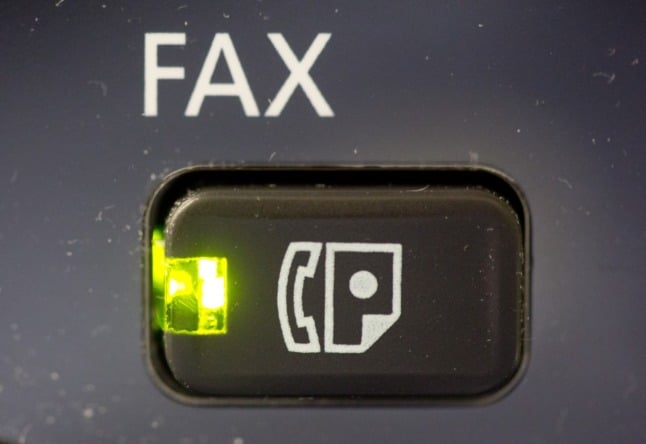What I've learned from five years of living in Berlin

From dealing with the unexpected and embracing culture to the hell of German bureaucracy and flat-hunting, here's what The Local's Rachel Loxton has learned from living in Berlin.
I didn’t plan to move to Germany the day after Burns Night - the celebration of the Scots poet Robert Burns on January 25th - but that’s how it happened. My family made the traditional haggis, neeps and tatties as a send-off, and I headed to Berlin the next day.
Somehow five years have passed and I’ve been reflecting on a few things I’ve learned along the way. I hope a few of you will relate, or find my experience helpful.
Things don’t always go to plan…
My plan was to see how it went in Berlin for six months. That’s manageable, I thought. Six months turned into a year, and here I am five years later. As a reaction to the Brexit vote among other things, I’d come to Berlin for an adventure, to see what was out there. I was lucky enough to have saved some money so quitting my job as a journalist in Aberdeen to go freelance in Berlin was scary but I had that financial cushion.
But then I tried freelancing and realised how hard it was. Germany is particularly savage towards freelancers who aren’t earning loads (just look at the cost of health insurance for the self-employed).
I needed a new strategy. So I signed up for a course to teach English as a foreign language and managed to get a freelance contract teaching people and businesses. It wasn’t well paid but it was consistent and it allowed me to write on the side.
READ ALSO: Everything you need to know about becoming a freelancer in Germany
…but that’s not always a bad thing
I learned a lot from teaching. The thing I liked most was that I got to spend time with Germans. The kind of Germans who didn’t necessarily speak that much English and were simply getting on with their lives. I love that Berlin is international and full of creative type, but it was a real pleasure to meet down to earth people. There were no hipsters on a 'gap yah' in sight. I loved going to Brandenburg to work at a factory where they ended up teaching me some German at the same time.

Passengers wait for a train at the Berlin main station. It's good to get out of the city sometimes. Photo: picture alliance/dpa | Christophe Gateau
I liked heading to the offices at the new BER airport (which was at that time still in its delayed closure phase) to chat to original Berliners, or the dude from Cologne, the woman from Hamburg. They taught me a lot about life in Germany that I’m not sure I would have been able to access so easily by staying inside the Berlin ring. They were friendly, open and welcoming which I appreciated.
You need (some) German
It can seem at times that everyone in Berlin speaks English and a lot of people do.
But I really do think you need to have basic understanding of German at the very least. For life admin, like having to call up the Finanzamt (tax office), utilities services or even at the supermarket if you want to have small talk with the cashier (I’m joking, why would you try this?), speaking the language is such an advantage.
It's not about being the best speaker, but it makes a difference when you try to learn. And Germans are so happy when people give it a go.
READ ALSO: 12 ways to improve your life in Germany without even trying
Flat-hunting is hell
Almost everyone who has ever tried to find a flat in Berlin wants to talk about how bad it is because we are traumatised. If you're lucky enough to get a flat viewing, there could be a hundred other applicants there. That's the reality; there are not enough flats. Or perhaps there are but there are not enough reasonably priced ones.
Those who are safely tucked away in state-owned apartments paying €300 a month for a three room place with a beautiful balcony will tell you that it wasn’t always that way. Or that you might get lucky! These people are annoying. Trying to find a flat in Berlin is so bad that one developer made a computer game about how depressing it is.

Flats in Berlin. Finding a decently-priced flat does feel like the treasure at the end of the rainbow. Photo: picture alliance/dpa | Gerald Matzka
My advice? If you plan to stay in Berlin for longer than a year, try and skip the sublet and sort out your own contract even if it takes time to find a place. Looking back, I wish I had done that, and maybe I’d be paying lower prices now. But listen. It’s hard out there. So we can only do our best.
There’s no getting around German bureaucracy
I sometimes say that I will drown in a pool of German bureaucracy but I’m only half joking. I am in awe at the amount of letters I get from German companies.
I heard someone say recently that in Germany, people on the whole are polite and welcoming - but institutions are not. That's my experience. There's a very aggressive business-like culture and that shows in the language used in letters and the way they do things.
Take the rent debacle. After the constitutional court ruled that the Mietendeckel - rent cap - was void, many people received a letter from their landlord demanding that the rent arrears were paid immediately, even though tenants had no say in any legislation in the first place.
At the end of the day, though, if you live here you have to accept it. Yes, you may end up having a massive filing system in your 30 square metre apartment full of letters that could have been emails or phone calls. But this is Germany. Things might be changing with the slow move towards modern technology but fax machines will always be held in high regard.

The dreaded fax machine is still a thing in Germany. Photo: picture alliance/dpa | Kay Nietfeld
Study the details
One thing I've learned is that it pays to read the small print, and to inquire. Despite the aggressive letters, sometimes having a phone call with a real person from the Finanzamt turns out to be a not-terrible experience and they can help sort things out with little fuss.
Big life changes are difficult abroad
Despite being in the very privileged position of choosing to move abroad, when life takes a turn for the worst, being away from home can feel awful. Whether it's a break-up, losing a job or struggling in general, it can be hard to be away from family and friends.
During the pandemic, a major aspect for people living abroad is that we can't travel home so easily. This hit me especially hard when Scotland brought in the hotel quarantine which meant I couldn't get back unless I paid a lot of money and spent 10 days in a hotel room. I started imagining that something would happen to family members and I would not get to see them. It sent my anxiety spiralling.
READ ALSO
- ‘We’re all living the same disaster’: How foreign residents are getting through the German lockdown winter
- You are not alone – living abroad in the time of corona
Embrace German life...
If you had told me five years ago that I would actually enjoy going to a nude spa, I would have laughed in your face. But, yes, I have discovered the joys of visiting the sauna "textilfrei" (literally textile free or nude). I am still a little giggly and British about it all but I am learning to embrace the German 'don't care' attitude to bodies.
Similarly, I am 100 percent on board with Abendbrot (yes - bread and cheese does make an evening meal!), the Wegbier (drinking a beer on the go - yes please) and Germany's better work-life-balance, at least compared to the UK. I like that politics here is less dysfunctional than Britain, and that cycling is encouraged.

A selection of Brötchen (rolls). Photo: picture alliance/dpa | Mohssen Assanimoghaddam
I love that you can travel easily to other countries from Germany when the pandemic allows.
I also love the variety of things you can do in Berlin, and the food, which ranges from Turkish to Vietnamese to Eritrean. It is such a culturally rich city in many ways.
READ ALSO: How Germany's marvellous bread helped me overcome food anxiety
... but stay true to yourself
You don't have to like everything about Germany. There are some things I'll never get on board with, like the EC "electronic cash" card. No, I don't really understand what it is and, no, I will never have one.
As well as a good moan, I've found it helpful to be myself even if it goes against the German - or at least Berlin - way of doing things. I will try out small talk with people sometimes even if they ignore me because I miss that culture from home.
I also like to surround myself with things I'm familiar with now and again. Perhaps that's why I was so excited to get what's known as a 'Burns supper' recently. Haggis, neeps and tatties in a Berlin bar seemed like the perfect way to mark five years of living here.
Comments (3)
See Also
I didn’t plan to move to Germany the day after Burns Night - the celebration of the Scots poet Robert Burns on January 25th - but that’s how it happened. My family made the traditional haggis, neeps and tatties as a send-off, and I headed to Berlin the next day.
Somehow five years have passed and I’ve been reflecting on a few things I’ve learned along the way. I hope a few of you will relate, or find my experience helpful.
Things don’t always go to plan…
My plan was to see how it went in Berlin for six months. That’s manageable, I thought. Six months turned into a year, and here I am five years later. As a reaction to the Brexit vote among other things, I’d come to Berlin for an adventure, to see what was out there. I was lucky enough to have saved some money so quitting my job as a journalist in Aberdeen to go freelance in Berlin was scary but I had that financial cushion.
But then I tried freelancing and realised how hard it was. Germany is particularly savage towards freelancers who aren’t earning loads (just look at the cost of health insurance for the self-employed).
I needed a new strategy. So I signed up for a course to teach English as a foreign language and managed to get a freelance contract teaching people and businesses. It wasn’t well paid but it was consistent and it allowed me to write on the side.
READ ALSO: Everything you need to know about becoming a freelancer in Germany
…but that’s not always a bad thing
I learned a lot from teaching. The thing I liked most was that I got to spend time with Germans. The kind of Germans who didn’t necessarily speak that much English and were simply getting on with their lives. I love that Berlin is international and full of creative type, but it was a real pleasure to meet down to earth people. There were no hipsters on a 'gap yah' in sight. I loved going to Brandenburg to work at a factory where they ended up teaching me some German at the same time.

I liked heading to the offices at the new BER airport (which was at that time still in its delayed closure phase) to chat to original Berliners, or the dude from Cologne, the woman from Hamburg. They taught me a lot about life in Germany that I’m not sure I would have been able to access so easily by staying inside the Berlin ring. They were friendly, open and welcoming which I appreciated.
You need (some) German
It can seem at times that everyone in Berlin speaks English and a lot of people do.
But I really do think you need to have basic understanding of German at the very least. For life admin, like having to call up the Finanzamt (tax office), utilities services or even at the supermarket if you want to have small talk with the cashier (I’m joking, why would you try this?), speaking the language is such an advantage.
It's not about being the best speaker, but it makes a difference when you try to learn. And Germans are so happy when people give it a go.
READ ALSO: 12 ways to improve your life in Germany without even trying
Flat-hunting is hell
Almost everyone who has ever tried to find a flat in Berlin wants to talk about how bad it is because we are traumatised. If you're lucky enough to get a flat viewing, there could be a hundred other applicants there. That's the reality; there are not enough flats. Or perhaps there are but there are not enough reasonably priced ones.
Those who are safely tucked away in state-owned apartments paying €300 a month for a three room place with a beautiful balcony will tell you that it wasn’t always that way. Or that you might get lucky! These people are annoying. Trying to find a flat in Berlin is so bad that one developer made a computer game about how depressing it is.

My advice? If you plan to stay in Berlin for longer than a year, try and skip the sublet and sort out your own contract even if it takes time to find a place. Looking back, I wish I had done that, and maybe I’d be paying lower prices now. But listen. It’s hard out there. So we can only do our best.
There’s no getting around German bureaucracy
I sometimes say that I will drown in a pool of German bureaucracy but I’m only half joking. I am in awe at the amount of letters I get from German companies.
I heard someone say recently that in Germany, people on the whole are polite and welcoming - but institutions are not. That's my experience. There's a very aggressive business-like culture and that shows in the language used in letters and the way they do things.
Take the rent debacle. After the constitutional court ruled that the Mietendeckel - rent cap - was void, many people received a letter from their landlord demanding that the rent arrears were paid immediately, even though tenants had no say in any legislation in the first place.
At the end of the day, though, if you live here you have to accept it. Yes, you may end up having a massive filing system in your 30 square metre apartment full of letters that could have been emails or phone calls. But this is Germany. Things might be changing with the slow move towards modern technology but fax machines will always be held in high regard.

Study the details
One thing I've learned is that it pays to read the small print, and to inquire. Despite the aggressive letters, sometimes having a phone call with a real person from the Finanzamt turns out to be a not-terrible experience and they can help sort things out with little fuss.
Big life changes are difficult abroad
Despite being in the very privileged position of choosing to move abroad, when life takes a turn for the worst, being away from home can feel awful. Whether it's a break-up, losing a job or struggling in general, it can be hard to be away from family and friends.
During the pandemic, a major aspect for people living abroad is that we can't travel home so easily. This hit me especially hard when Scotland brought in the hotel quarantine which meant I couldn't get back unless I paid a lot of money and spent 10 days in a hotel room. I started imagining that something would happen to family members and I would not get to see them. It sent my anxiety spiralling.
READ ALSO
- ‘We’re all living the same disaster’: How foreign residents are getting through the German lockdown winter
- You are not alone – living abroad in the time of corona
Embrace German life...
If you had told me five years ago that I would actually enjoy going to a nude spa, I would have laughed in your face. But, yes, I have discovered the joys of visiting the sauna "textilfrei" (literally textile free or nude). I am still a little giggly and British about it all but I am learning to embrace the German 'don't care' attitude to bodies.
Similarly, I am 100 percent on board with Abendbrot (yes - bread and cheese does make an evening meal!), the Wegbier (drinking a beer on the go - yes please) and Germany's better work-life-balance, at least compared to the UK. I like that politics here is less dysfunctional than Britain, and that cycling is encouraged.

I love that you can travel easily to other countries from Germany when the pandemic allows.
I also love the variety of things you can do in Berlin, and the food, which ranges from Turkish to Vietnamese to Eritrean. It is such a culturally rich city in many ways.
READ ALSO: How Germany's marvellous bread helped me overcome food anxiety
... but stay true to yourself
You don't have to like everything about Germany. There are some things I'll never get on board with, like the EC "electronic cash" card. No, I don't really understand what it is and, no, I will never have one.
As well as a good moan, I've found it helpful to be myself even if it goes against the German - or at least Berlin - way of doing things. I will try out small talk with people sometimes even if they ignore me because I miss that culture from home.
I also like to surround myself with things I'm familiar with now and again. Perhaps that's why I was so excited to get what's known as a 'Burns supper' recently. Haggis, neeps and tatties in a Berlin bar seemed like the perfect way to mark five years of living here.
Join the conversation in our comments section below. Share your own views and experience and if you have a question or suggestion for our journalists then email us at [email protected].
Please keep comments civil, constructive and on topic – and make sure to read our terms of use before getting involved.
Please log in here to leave a comment.